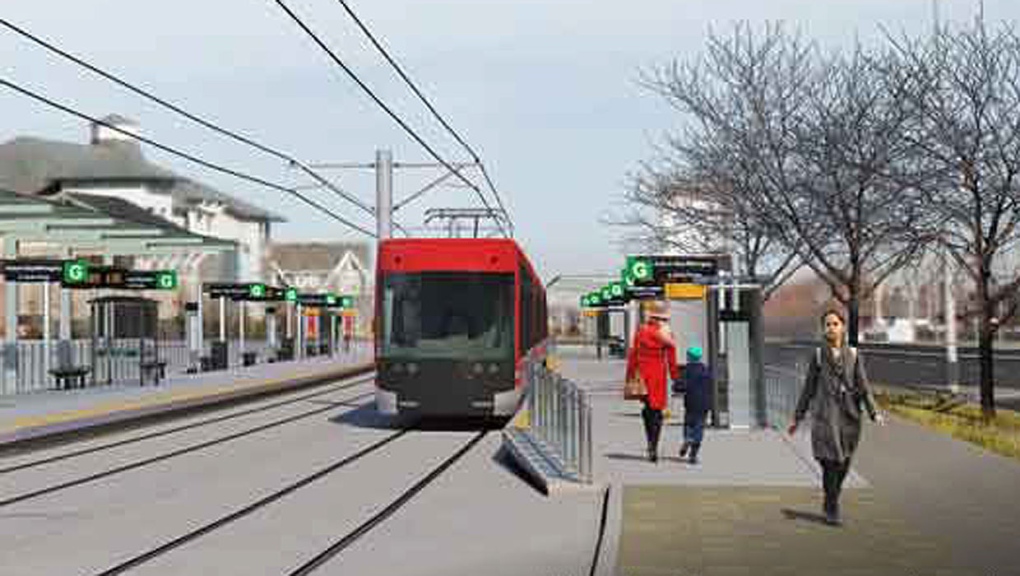City chooses Spanish firm to supply cars for the Green Line
 The Green Line will be serviced by 28 low-floor LRV cars built by a Spanish company. (Supplied)
The Green Line will be serviced by 28 low-floor LRV cars built by a Spanish company. (Supplied)
The city's new Green Line will be on the leading edge of transportation technology when it opens for service in about five years and that includes the cars Calgarians will ride in.
City officials announced they've granted a contract to Spain's Construcciones y Auxiliar de Ferrocarriles (CAF) to supply its new fleet of 28 low-floor light rail vehicles (LRVs) that will be used exclusively on the Green Line.
The model, which is already in use across Europe, Asia, Australia and New Zealand, is quickly becoming the standard for transit systems in North America.
The low-floor LRVs "improve accessibility, reduce station footprint and enhance safety for pedestrians and vehicles."
Officials say awarding the contract is the next step in delivering the new service to Calgarians.
"CAF's proposal met all of The City's technical and commercial requirements and their Urbos 100 LRVs offer proven modern low-floor technology adding excellent value for Calgarians," said Darshpreet Bhatti, Green Line CEO, in a statement.
"CAF is an industry leader and this new fleet will provide Calgary with a world class transit option."
 (Supplied)
(Supplied)
The agreement will also provide the opportunity for the City to purchase additional vehicles, as well as tools and operational support to maintain its new fleet.
CAF's general chief sales officer Jesús Esnaola Altuna says the company is grateful that the City chose them for the project.
"We are extremely committed and enthusiastic about this project and would like to draw attention to the transparency of the bidding process as well as the professionalism shown by Calgary’s project team," he said in a release.
It's the first project CAF will complete in Canada.
The Green Line is the largest infrastructure project in the city's history, costing approximately $5.5 billion with funding commitments from the federal government, provincial government and the City of Calgary.
The system expected to be complete in either 2025 or 2026.
CTVNews.ca Top Stories

Ottawa police identify victim of Christmas Day homicide in Hintonburg, charge suspect
The Ottawa Police Service says the victim who has been killed on Christmas Day in Hintonburg has been identified.
Bird flu, measles top 2025 concerns for Canada's chief public health officer
As we enter 2025, Dr. Theresa Tam has her eye on H5N1 bird flu, an emerging virus that had its first human case in Canada this year.
Christmas shooting at Phoenix airport leaves 3 people wounded
Police are investigating a Christmas shooting at Sky Harbor Airport in Phoenix that left three people injured by gunfire.
Your kid is spending too much time on their phone. Here's what to do about it
Wondering what your teen is up to when you're not around? They are likely on YouTube, TikTok, Instagram or Snapchat, according to a new report.
Plush toys recalled due to choking hazard
Health Canada announced a recall on a series of plush toys due to a choking hazard. Anyone who has purchased an elephant, giraffe, lion, tiger and/or panda plush toy with an attached baby can return them to the place of purchase for a refund.
6,000 inmates stage Christmas Day escape from high-security Mozambique prison
At least 6,000 inmates escaped from a high-security prison in Mozambique's capital on Christmas Day after a rebellion, the country's police chief said, as widespread post-election riots and violence continue to engulf the country.
Azerbaijan observes day of mourning for air crash victims as speculation mount about its cause
Azerbaijan on Thursday observed a nationwide day of mourning for the victims of the plane crash that killed 38 people and left all 29 survivors injured as speculation mounted about a possible cause of the disaster, with some experts saying that the airliner was damaged by Russian air defence fire.
Donald Trump says he urged Wayne Gretzky to run for prime minister in Christmas visit
U.S. president-elect Donald Trump says he told Canadian hockey legend Wayne Gretzky he should run for prime minister during a Christmas visit but adds that the athlete declined interest in politics.
Prayers and tears mark 20 years since the Indian Ocean tsunami that killed some 230,000 people
People gathered in prayer and visited mass graves in Indonesia’s Aceh province on Thursday to mark 20 years since the massive Indian Ocean tsunami hit the region in one of modern history’s worst natural disasters.





























